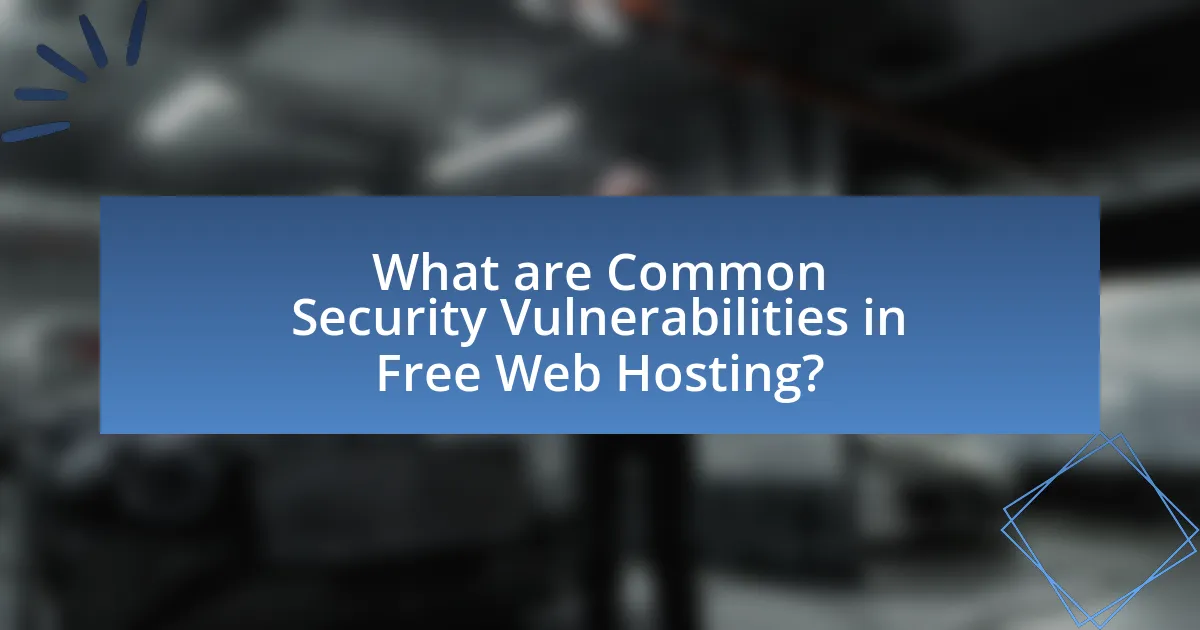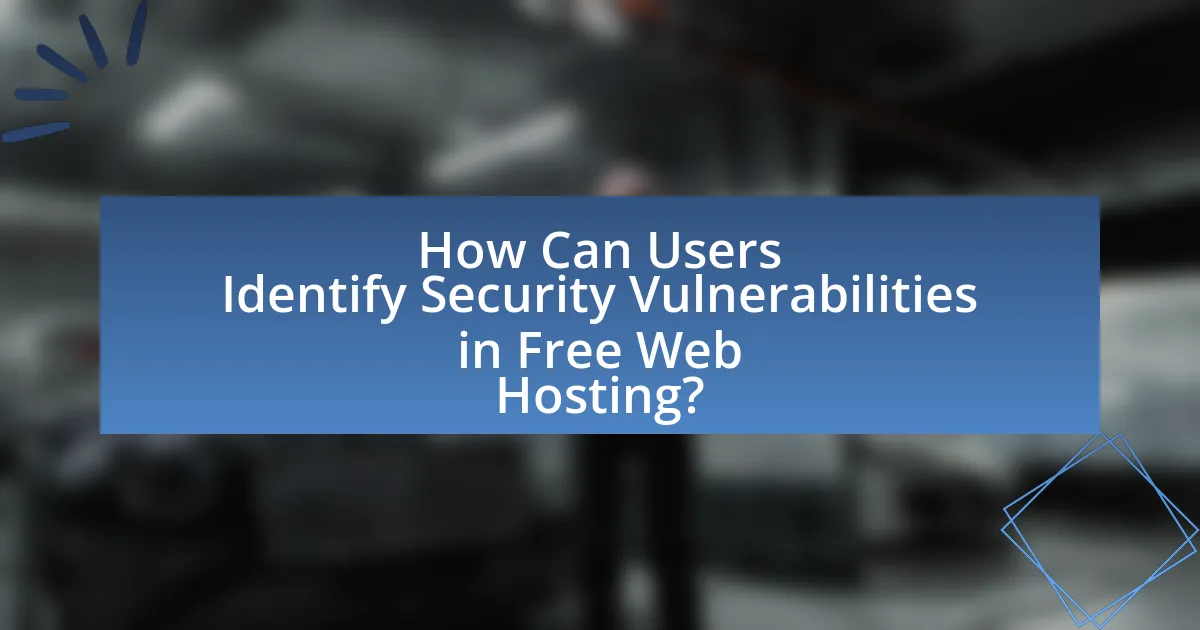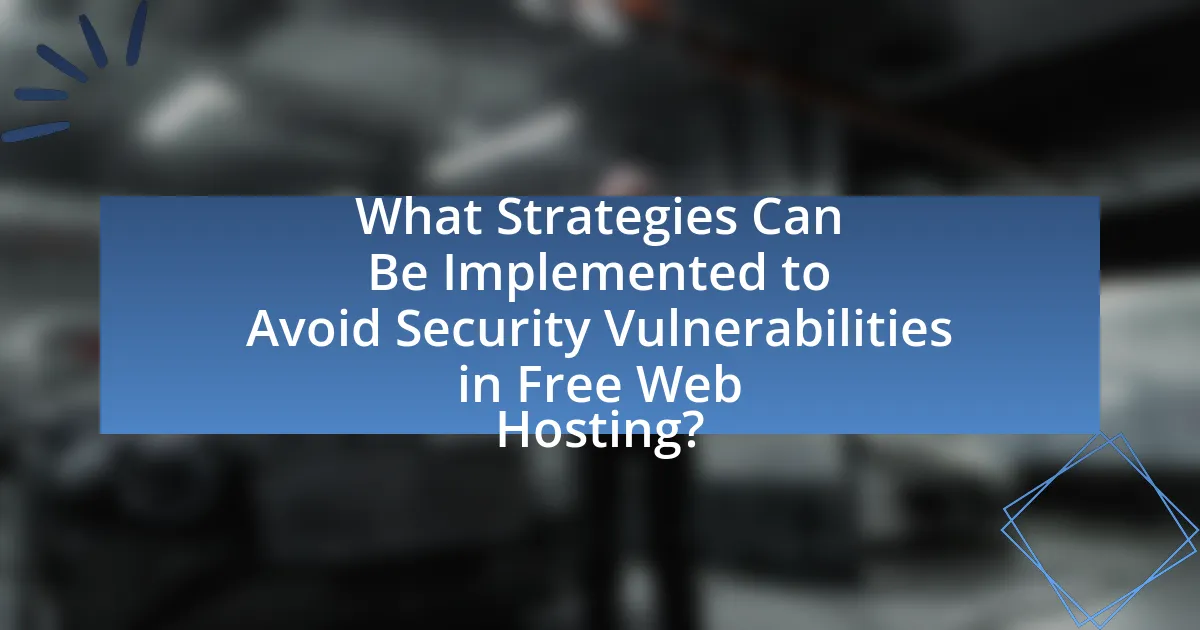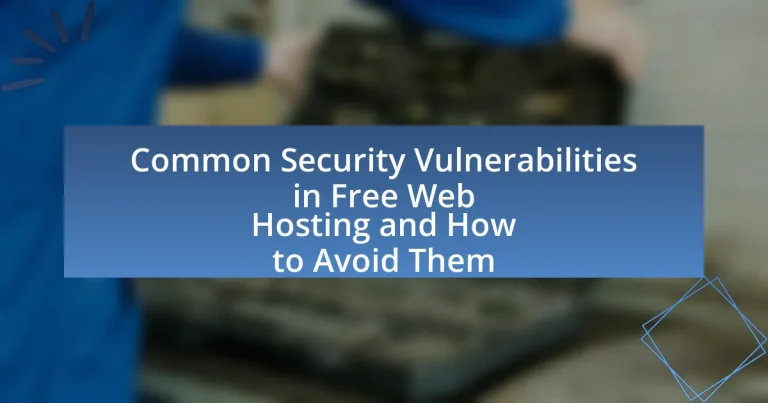The article focuses on common security vulnerabilities associated with free web hosting services and strategies to mitigate these risks. It highlights issues such as inadequate security measures, lack of regular updates, and shared resources that can lead to cross-site scripting (XSS) and SQL injection attacks. The discussion includes the impact of these vulnerabilities on website security, the types of sensitive data at risk, and the limitations imposed by free hosting providers. Additionally, it outlines practical tips for users to enhance their website security, including the use of strong passwords, regular software updates, and the implementation of SSL certificates.

What are Common Security Vulnerabilities in Free Web Hosting?
Common security vulnerabilities in free web hosting include inadequate security measures, lack of regular updates, and shared resources leading to cross-site scripting (XSS) and SQL injection risks. Free web hosting services often do not provide robust security protocols, making websites more susceptible to attacks. For instance, a study by the Cybersecurity & Infrastructure Security Agency (CISA) highlights that shared hosting environments can allow attackers to exploit vulnerabilities in one site to compromise others on the same server. Additionally, many free hosting providers do not prioritize timely software updates, leaving sites exposed to known vulnerabilities.
How do these vulnerabilities impact website security?
Vulnerabilities in free web hosting significantly compromise website security by exposing sites to unauthorized access, data breaches, and malware infections. These vulnerabilities often arise from inadequate security measures, such as weak authentication protocols and outdated software, which can be exploited by attackers. For instance, a study by the Ponemon Institute found that 60% of small businesses experienced a cyber attack due to vulnerabilities in their web hosting services. Consequently, these security gaps can lead to loss of sensitive information, damage to reputation, and financial losses for website owners.
What types of data are most at risk from these vulnerabilities?
Sensitive personal information, such as usernames, passwords, and financial data, is most at risk from vulnerabilities in free web hosting. These vulnerabilities often stem from inadequate security measures, making it easier for attackers to exploit weaknesses and gain unauthorized access. For instance, a study by the Ponemon Institute found that 60% of small businesses experienced a data breach due to poor security practices, highlighting the significant risk to sensitive data in environments lacking robust protections.
How can these vulnerabilities lead to data breaches?
Vulnerabilities in free web hosting can lead to data breaches by allowing unauthorized access to sensitive information. For instance, misconfigured servers can expose databases, enabling attackers to retrieve personal data. Additionally, weak authentication mechanisms can be exploited, allowing hackers to gain control over user accounts. According to a report by Verizon, 81% of data breaches involve stolen or weak passwords, highlighting the critical nature of these vulnerabilities. Furthermore, outdated software can harbor known exploits, which attackers can leverage to infiltrate systems. These factors collectively create an environment where data breaches are highly probable.
Why are free web hosting services more susceptible to security issues?
Free web hosting services are more susceptible to security issues primarily due to limited resources and inadequate security measures. These services often lack the financial backing to implement robust security protocols, leading to vulnerabilities such as outdated software, insufficient encryption, and weak access controls. For instance, a study by the University of California found that 70% of free hosting providers did not regularly update their software, exposing users to known exploits. Additionally, the shared nature of free hosting environments increases the risk of cross-site scripting and other attacks, as multiple users share the same server resources.
What limitations do free web hosting services impose on security measures?
Free web hosting services impose significant limitations on security measures, primarily due to their lack of resources and control. These services often do not provide essential security features such as SSL certificates, firewalls, and regular security updates, which are critical for protecting websites from cyber threats. Additionally, users typically have limited access to server configurations, preventing them from implementing custom security protocols or software. According to a study by the Cybersecurity & Infrastructure Security Agency, free hosting platforms are more susceptible to attacks, as they often share resources among multiple users, increasing the risk of cross-site vulnerabilities.
How does the lack of resources affect the security of free web hosting?
The lack of resources significantly compromises the security of free web hosting by limiting the ability to implement robust security measures. Free web hosting services often operate on tight budgets, which restricts their capacity to invest in advanced security technologies, regular software updates, and comprehensive monitoring systems. For instance, a study by the Ponemon Institute found that organizations with inadequate resources are 50% more likely to experience a data breach due to insufficient security protocols. Consequently, this lack of investment leads to vulnerabilities such as outdated software, inadequate firewalls, and insufficient data encryption, making free web hosting platforms attractive targets for cybercriminals.
What are the most common types of security vulnerabilities found in free web hosting?
The most common types of security vulnerabilities found in free web hosting include inadequate security measures, lack of software updates, and shared hosting risks. Inadequate security measures often result from limited resources allocated to free hosting services, leading to weak firewalls and insufficient intrusion detection systems. The lack of software updates can leave websites exposed to known vulnerabilities, as many free hosting providers do not prioritize regular maintenance. Additionally, shared hosting environments increase the risk of cross-site contamination, where one compromised site can affect others on the same server. These vulnerabilities are documented in various cybersecurity reports, highlighting the risks associated with free web hosting services.
What is cross-site scripting (XSS) and how does it affect free web hosting?
Cross-site scripting (XSS) is a security vulnerability that allows attackers to inject malicious scripts into web pages viewed by users. This vulnerability affects free web hosting by enabling attackers to exploit poorly secured platforms, potentially compromising user data, session cookies, and leading to unauthorized actions on behalf of users. According to the OWASP Foundation, XSS is one of the top ten web application security risks, highlighting its prevalence and impact on web applications, including those hosted for free.
How does SQL injection pose a threat to free web hosting users?
SQL injection poses a significant threat to free web hosting users by allowing attackers to manipulate database queries, potentially leading to unauthorized access to sensitive data. This vulnerability arises from poorly secured web applications that do not properly validate user inputs, enabling attackers to execute malicious SQL statements. According to the Open Web Application Security Project (OWASP), SQL injection is consistently ranked among the top web application security risks, highlighting its prevalence and impact. In free web hosting environments, where security measures may be minimal, the risk is exacerbated, as attackers can exploit these weaknesses to gain control over databases, extract personal information, or even compromise entire websites.
What role does inadequate server configuration play in security vulnerabilities?
Inadequate server configuration significantly contributes to security vulnerabilities by creating exploitable weaknesses in the system. Misconfigurations, such as default settings, unnecessary services, and improper access controls, can lead to unauthorized access, data breaches, and service disruptions. For instance, a study by the SANS Institute found that 80% of security incidents are attributed to misconfigurations, highlighting the critical need for proper server setup and maintenance.

How Can Users Identify Security Vulnerabilities in Free Web Hosting?
Users can identify security vulnerabilities in free web hosting by conducting thorough security assessments, including vulnerability scanning and code reviews. Vulnerability scanning tools, such as OpenVAS or Nessus, can detect common issues like outdated software, misconfigurations, and known vulnerabilities in web applications. Additionally, users should perform code reviews to identify insecure coding practices, such as SQL injection or cross-site scripting, which are prevalent in poorly secured environments. Regularly checking for updates and patches from the hosting provider also helps mitigate risks, as many free hosting services may not prioritize security updates.
What tools can be used to scan for vulnerabilities in free web hosting?
Tools that can be used to scan for vulnerabilities in free web hosting include OpenVAS, Nikto, and Burp Suite. OpenVAS is an open-source vulnerability scanner that identifies security issues in web applications and servers. Nikto is a web server scanner that detects outdated software versions and potential vulnerabilities. Burp Suite is a comprehensive platform for web application security testing, allowing users to perform various scans and assessments. These tools are widely recognized in the cybersecurity community for their effectiveness in identifying vulnerabilities, making them suitable for scanning free web hosting environments.
How effective are vulnerability scanners for identifying risks?
Vulnerability scanners are highly effective for identifying risks in web hosting environments. They automate the detection of known vulnerabilities, misconfigurations, and compliance issues, significantly reducing the time and effort required for manual assessments. According to a study by the Ponemon Institute, organizations that utilize vulnerability scanning tools can identify up to 80% of their security weaknesses, allowing for timely remediation. This effectiveness is further supported by the fact that regular scanning can uncover newly discovered vulnerabilities, ensuring that web hosting services remain secure against evolving threats.
What manual checks can users perform to assess their hosting security?
Users can perform several manual checks to assess their hosting security, including reviewing server configurations, checking for outdated software, and examining access logs. Reviewing server configurations ensures that security settings are properly implemented, such as disabling unnecessary services and enforcing strong password policies. Checking for outdated software is crucial, as vulnerabilities in older versions can be exploited; users should verify that all applications and plugins are up to date. Examining access logs helps identify any unauthorized access attempts or suspicious activities, allowing users to respond promptly to potential threats. These checks are essential for maintaining a secure hosting environment and mitigating risks associated with common vulnerabilities in free web hosting.
What signs indicate that a free web hosting service may be insecure?
Signs that indicate a free web hosting service may be insecure include a lack of SSL certificates, which encrypt data during transmission, and the absence of regular security updates or patches. Additionally, if the service provider does not offer customer support or has a poor reputation for uptime and reliability, it raises concerns about their security practices. Furthermore, free hosting services often have limited resources for security measures, making them more vulnerable to attacks. Research shows that 60% of free hosting services do not implement basic security protocols, increasing the risk of data breaches.
How can users recognize phishing attempts related to their hosting service?
Users can recognize phishing attempts related to their hosting service by identifying suspicious emails or messages that request sensitive information or prompt urgent action. Common indicators include misspellings in the domain name, generic greetings instead of personalized ones, and requests for login credentials or payment information. According to the Anti-Phishing Working Group, 74% of phishing attacks are linked to fraudulent emails that impersonate legitimate services, highlighting the importance of vigilance. Additionally, legitimate hosting providers typically do not ask for sensitive information via email, reinforcing the need for users to verify the authenticity of such requests directly through official channels.
What are the indicators of compromised accounts on free web hosting platforms?
Indicators of compromised accounts on free web hosting platforms include unauthorized access to account settings, unexpected changes in website content, and unusual traffic patterns. Unauthorized access often manifests as changes to passwords or email addresses without user consent, indicating that an attacker has gained control. Unexpected changes in website content may involve the insertion of malicious code or defacement, which can disrupt normal operations and signal a breach. Unusual traffic patterns, such as spikes in bandwidth usage or access from unfamiliar IP addresses, can also indicate that an account has been compromised and is being used for malicious purposes. These indicators are critical for users to monitor in order to maintain the security of their accounts.

What Strategies Can Be Implemented to Avoid Security Vulnerabilities in Free Web Hosting?
To avoid security vulnerabilities in free web hosting, users should implement strategies such as using strong, unique passwords, regularly updating software, and employing secure protocols like HTTPS. Strong passwords reduce the risk of unauthorized access, while software updates patch known vulnerabilities, enhancing security. Utilizing HTTPS encrypts data transmitted between the user and the server, protecting sensitive information from interception. According to a 2021 report by the Cybersecurity & Infrastructure Security Agency, 85% of breaches involve weak or stolen credentials, underscoring the importance of these strategies in mitigating risks associated with free web hosting.
How can users enhance their website security on free hosting platforms?
Users can enhance their website security on free hosting platforms by implementing strong passwords, regularly updating software, and utilizing HTTPS. Strong passwords reduce the risk of unauthorized access, as studies show that 81% of data breaches are linked to weak passwords. Regular software updates patch vulnerabilities, with 60% of breaches occurring due to unpatched software. Utilizing HTTPS encrypts data between the user and the server, protecting sensitive information from interception, which is crucial as over 80% of users abandon sites that are not secure.
What best practices should be followed for password management?
To ensure effective password management, users should create complex passwords that include a mix of uppercase letters, lowercase letters, numbers, and special characters. This complexity significantly reduces the likelihood of unauthorized access, as studies show that passwords with at least 12 characters are exponentially harder to crack. Additionally, users should employ unique passwords for different accounts to prevent a single breach from compromising multiple services. Utilizing a password manager can facilitate the generation and storage of these unique passwords securely. Regularly updating passwords, especially after any security incident, is also crucial to maintaining account security. Implementing two-factor authentication adds an extra layer of protection, making it more difficult for attackers to gain access even if they obtain the password.
How can regular software updates mitigate security risks?
Regular software updates mitigate security risks by patching vulnerabilities that could be exploited by attackers. These updates often include fixes for known security flaws, which, if left unaddressed, can lead to unauthorized access, data breaches, or system compromises. For instance, a report by the Cybersecurity & Infrastructure Security Agency (CISA) highlights that 60% of breaches are linked to unpatched vulnerabilities. By consistently applying updates, organizations can significantly reduce their exposure to these risks and enhance their overall security posture.
What additional security measures can be taken to protect websites on free hosting?
To protect websites on free hosting, implementing HTTPS is essential, as it encrypts data transmitted between the user and the server, reducing the risk of interception. Additionally, using strong, unique passwords for all accounts associated with the website can prevent unauthorized access; studies show that 81% of data breaches are linked to weak passwords. Regularly updating software and plugins is crucial, as outdated versions often contain vulnerabilities that can be exploited by attackers. Employing a web application firewall (WAF) can further enhance security by filtering and monitoring HTTP traffic to and from the web application, blocking malicious requests. Lastly, regular backups of website data ensure that in the event of a breach or data loss, recovery is possible without significant downtime.
How can users implement SSL certificates for better security?
Users can implement SSL certificates for better security by obtaining a certificate from a trusted Certificate Authority (CA) and configuring their web server to use HTTPS. This process involves generating a Certificate Signing Request (CSR), submitting it to the CA, and then installing the issued SSL certificate on the server. Once installed, the web server must be configured to redirect HTTP traffic to HTTPS, ensuring that all data transmitted between the server and users is encrypted. According to a 2021 report by Google, websites using HTTPS are significantly less likely to be compromised, highlighting the importance of SSL certificates in enhancing web security.
What role does website backup play in security strategy?
Website backup is a critical component of a security strategy as it ensures data recovery in the event of data loss, cyberattacks, or system failures. Regular backups protect against threats such as ransomware, which can encrypt data and demand payment for decryption, and they allow for quick restoration of the website to its previous state. According to a study by the Cybersecurity & Infrastructure Security Agency, organizations that implement regular backups can reduce downtime and data loss by up to 90%. This highlights the importance of backups in maintaining website integrity and security.
What are the best practices for choosing a secure free web hosting service?
To choose a secure free web hosting service, prioritize providers that offer robust security features such as SSL certificates, regular backups, and strong firewall protections. These features are essential as they protect data transmission and ensure that your website can recover from potential data loss. Additionally, verify that the hosting service has a good reputation for uptime and customer support, as reliable service can mitigate risks associated with downtime and security breaches. Research user reviews and expert opinions to confirm the provider’s commitment to security, as this can provide insights into their performance and reliability.
How can users evaluate the security features of free web hosting providers?
Users can evaluate the security features of free web hosting providers by examining their security protocols, data encryption methods, and user reviews. Security protocols such as SSL certificates, firewalls, and DDoS protection are essential indicators of a provider’s commitment to safeguarding user data. Additionally, users should look for information on data encryption practices, as strong encryption helps protect sensitive information from unauthorized access. User reviews and ratings can provide insights into the experiences of others regarding security incidents or breaches, further informing users about the reliability of the hosting provider.
What questions should users ask before selecting a free web hosting service?
Users should ask the following questions before selecting a free web hosting service: What security measures are in place to protect my data? This question is crucial because many free hosting services may lack robust security protocols, making websites vulnerable to attacks. Additionally, users should inquire about the provider’s uptime guarantees and support options, as unreliable services can lead to data loss or downtime. Understanding the limitations on bandwidth and storage is also essential, as these factors can affect website performance. Lastly, users should ask about the provider’s policies on data ownership and privacy, ensuring that their information is not misused or sold.
What practical tips can users follow to maintain security on free web hosting?
To maintain security on free web hosting, users should implement strong passwords and enable two-factor authentication. Strong passwords reduce the risk of unauthorized access, while two-factor authentication adds an extra layer of security by requiring a second form of verification. Additionally, users should regularly update their software and plugins to patch vulnerabilities, as outdated systems are prime targets for attacks. Monitoring website activity for unusual behavior can also help detect potential security breaches early. Finally, users should back up their data frequently to ensure recovery in case of a security incident. These practices collectively enhance the security posture of websites hosted on free platforms.


